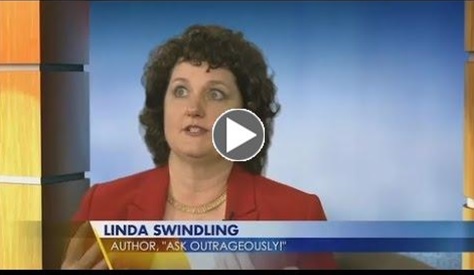Have you ever lost your train of thought at a critical time?
Last week I was interviewed on TV and found myself at a loss for words. At the beginning of the show, my mind wandered and it took me a few seconds to concentrate on what I was saying. Admittedly, there was a lot going on. My husband was in the TV studio with me, we had just seen our son (who is away at college) AND I was speaking three times that day at my alma mater, Texas Tech University.
When you are excited, stressed or afraid, you can lose focus. In fact, research for my upcoming book, Ask Outrageously!, reveals these top reasons why people are afraid to ask for what they want.
I will frustrate or bug the person I’m asking.
I will use the wrong words.
I will embarrass myself or look stupid.
I will be told “No.”
** (By the way, if you are curious about the real reason why people are telling you “No,” read this recent article I was interviewed for in Huffington Post.)
When you are in a stressful situation, use the ASK Strategy. It helps you regain composure to understand and calmly discuss all kinds of issues.
A: Aware. Be aware of what is happening. When you receive an angry call or have an unexpected conversation, what are you aware of? Gain control of your thoughts and emotions by asking yourself:
What am I aware of … right now … in this moment in time?
Pay attention to your surroundings by noticing the fabric of your chair, the color of the walls, the flooring. Look at the outfit someone is wearing.
If you are stressed, notice how your body is reacting. Is your heart racing? Are you breathing too shallowly or quickly? Slow your breathing down by counting as you inhale and then as you exhale. Are your eyes tearing up or unable to focus? Look up at the art on the wall and really examine it.
S: Seek clarification. Being surprised or stressed can make you lose focus. Before you expend unnecessary energy or become emotional, ask for more information. Ask clarifying questions and repeat the exact words you hear without emotion.
What I heard you say was ______. Did I understand you correctly?
Could you describe what you mean when you say ________?
Breathe and let them explain. Ask more questions to understand first before forming your response. Maintain eye contact but take notes if possible. Writing helps you maintain a sense of control and stay objective.
If questioned you can say, “Your comments are important to me. I want to make sure I understand you correctly before responding.”
K: Know.
With the information you have gained, know your next best request. You don’t have to have all the details filled in, just know what to ask next.
Perhaps you ask:
What outcome are you looking for?
How do you think this issue should be handled?
Then, listen.
You may ask for a break and say:
This information comes as a surprise. You’ve thought a lot about it. Let’s take a break so I can look into this matter.
You deserve a thoughtful response. Do you want to meet again at ________?
Once alone, ask yourself more questions to help gain clarity.
What is my real concern about this issue?
What are my options?
What makes sense right now?
What’s the worst thing that can happen and can I live with it?
Emotions or reactions can sabotage you and keep you from thinking clearly and objectively. Instead of allowing emotions to control you, use them as a signal to pay attention and focus asking questions. Pause, breathe and ask outrageously. Who knows…your next request may make the news!
About Linda: A recognized authority on negotiations, workplace issues and strategic communication, Linda Swindling, JD, CSP is an author, media expert, a “recovering” employment attorney, and a professional speaker. Contact us to book Linda to speak at your event.
